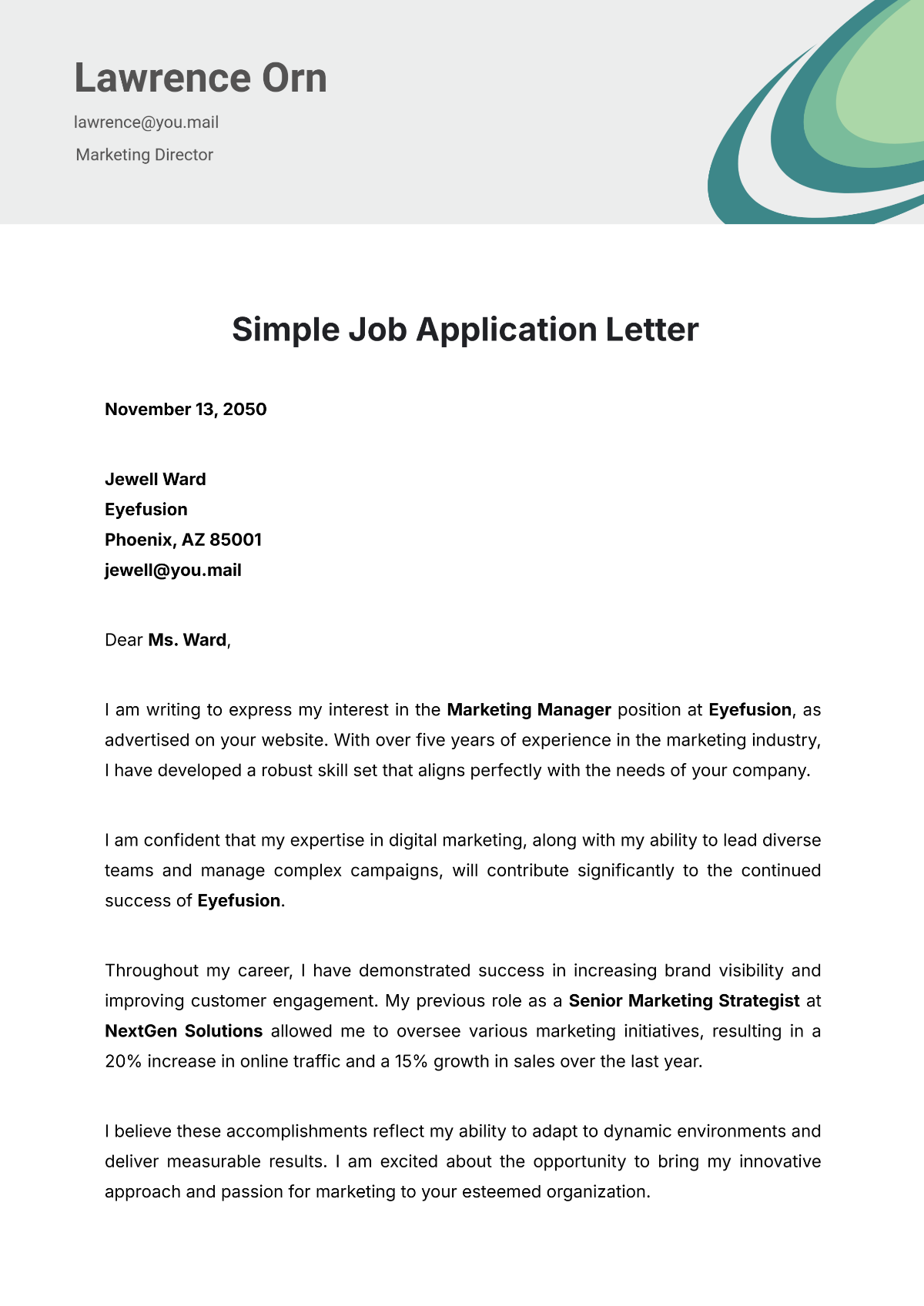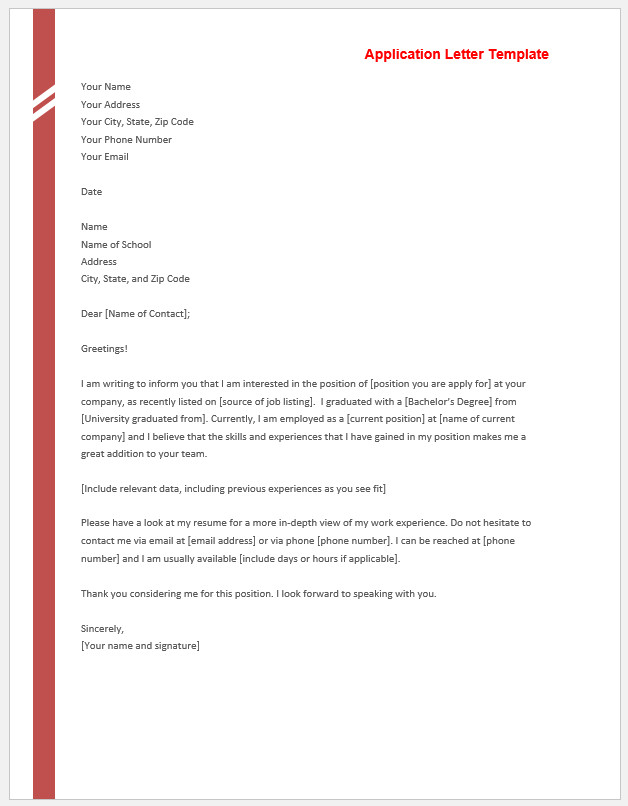When applying for a job, your resume is often the first document that employers review. While it provides a brief overview of your skills and experience, it may not fully capture your qualifications and why you are the ideal candidate for the position. This is where an application letter comes in.
A well-crafted application letter can support your resume and provide additional context, allowing you to showcase your strengths and stand out from other applicants.
What is an Application Letter?
An application letter, also known as a cover letter, is a document that accompanies your resume when applying for a job. It is typically one page in length and provides an opportunity for you to explain why you are interested in the position and how your skills and experience make you a strong fit.
The letter should be tailored to the specific job you are applying for and highlight key achievements and qualifications that are relevant to the role.
Why Should You Include an Application Letter?
While your resume provides a concise summary of your qualifications, an application letter allows you to expand on your skills and experiences in more detail.
Here are a few reasons why including a letter with your resume can be beneficial:
- Personalize your application: An application letter allows you to address the hiring manager directly and convey your interest in the position.
- Showcase your fit: By highlighting specific skills and experiences that align with the job requirements, you can demonstrate why you are the ideal candidate for the role.
- Provide context: If there are any gaps in your resume or if you are making a career transition, an application letter allows you to explain these circumstances and provide additional context.
- Highlight achievements: Use the letter to showcase specific accomplishments that are relevant to the job, giving the employer a better understanding of your capabilities.
- Display your writing skills: A well-written application letter can demonstrate your communication and writing abilities, which are important in many professional roles.
How to Write an Effective Application Letter
Now that you understand the importance of an application letter, let’s explore how to write one that will impress potential employers:
1. Research the Company and Job
Before you begin writing your letter, thoroughly research the company and job you are applying for. This will allow you to tailor your letter to the specific role and demonstrate your understanding of the organization’s values and goals. Look for keywords and phrases in the job description that you can incorporate into your letter.
2. Format Your Letter Properly
An application letter should follow a professional format. Include your contact information at the top of the letter, followed by the date and the recipient’s name, title, and company. Use a formal greeting, such as “Dear Hiring Manager,” and address the recipient by name if possible. Keep the letter concise and focused, aiming for around three to four paragraphs.
3. Start with a Strong Opening Paragraph
The opening paragraph of your letter should grab the employer’s attention and clearly state the position you are applying for. Briefly explain why you are interested in the role and how your experience aligns with the job requirements. This is your chance to make a strong first impression and entice the reader to continue reading.
4. Highlight Your Relevant Skills and Experiences
In the body of your letter, focus on highlighting the most relevant skills and experiences that make you a strong candidate for the job. Use specific examples to demonstrate how you have successfully applied these skills in past roles. Avoid simply restating information from your resume; instead, provide additional context and explain how your qualifications align with the position.
5. Show Enthusiasm and Interest
Throughout your letter, convey your enthusiasm and interest in the position and the company. Explain why you are specifically interested in working for this organization and how you believe your skills and values align with theirs. Employers are looking for candidates who are genuinely passionate about the role and the company’s mission.
6. Close with a Strong Conclusion
In the closing paragraph, reiterate your interest in the position and express your willingness to discuss your qualifications further. Thank the employer for considering your application and provide your contact information so they can easily reach you. End the letter with a professional closing, such as “Sincerely” or “Best regards,” followed by your full name.
7. Proofread and Edit
Before sending your application letter, make sure to carefully proofread and edit it for any errors or typos. Pay attention to grammar, punctuation, and sentence structure. It can be helpful to read the letter aloud or ask someone else to review it for you. A polished and error-free letter shows attention to detail and professionalism.
8. Customize for Each Application
While it may be tempting to use a generic application letter for multiple job applications, it is important to customize each letter for the specific position you are applying for. Tailor the content to match the job requirements and highlight the skills and experiences that are most relevant to the role. This will show the employer that you have taken the time to understand their needs and are genuinely interested in the position.
9. Use a Professional Tone
When writing your application letter, maintain a professional tone throughout. Avoid using overly casual language or slang, and keep the focus on your qualifications and fit for the job. Use clear and concise language, and avoid using jargon or technical terms that may not be familiar to the reader.
10. Follow Up
After submitting your application letter and resume, it can be beneficial to follow up with the employer to express your continued interest in the position. This can be done through a polite email or phone call. However, make sure to respect the employer’s timeline and only follow up once if you have not received a response.
Example of an Application Letter
Here is an example of an application letter that incorporates the tips mentioned above:
[Your Name]
[Your Address]
[City, State, ZIP Code]
[Email Address]
[Phone Number]
[Date][Hiring Manager’s Name]
[Company Name]
[Company Address]
[City, State, ZIP Code]Dear Hiring Manager,
I am writing to apply for the [Job Title] position at [Company Name], as advertised on [Job Board/Company Website]. I am excited about the opportunity to join your team and believe that my skills and experience make me a strong candidate for this role.
Throughout my [number of years] years of experience in [industry/field], I have developed a strong background in [relevant skills]. In my most recent role as [previous position], I successfully [specific achievement or responsibility]. This experience has allowed me to refine my [specific skills] and develop a deep understanding of [relevant industry/field].
I am particularly drawn to [Company Name]’s commitment to [specific value or goal], as it aligns with my own values and aspirations. I am impressed by the company’s dedication to [specific initiative or project], and I believe that my skills in [relevant skill] and [relevant skill] would contribute to the success of this endeavor.
I am confident that my strong [specific skill] and [specific skill] would make me a valuable asset to your team. I am eager to bring my passion for [industry/field] and my dedication to [specific goal] to [Company Name]. I look forward to the opportunity to discuss my qualifications further and how I can contribute to the continued success of [Company Name].
Thank you for considering my application. I have attached my resume for your review. Please do not hesitate to contact me at [Phone Number] or [Email Address] if you require any additional information. I appreciate your time and consideration.
Sincerely,
[Your Name]




Tips for a Successful Application Letter
Here are some additional tips to help you write a successful application letter:
- Keep it concise: Aim for a one-page letter that highlights your most relevant qualifications without overwhelming the reader.
- Use keywords: Incorporate keywords and phrases from the job description to show that you meet the specific requirements of the position.
- Address any potential concerns: If there are any gaps in your employment history or if you are changing careers, use the letter to address these potential concerns and provide a clear explanation.
- Proofread and edit: Ensure that your letter is error-free and well-written. Pay attention to grammar, punctuation, and spelling.
- Show gratitude: Express your appreciation for the employer’s consideration and thank them for the opportunity to apply.
By following these guidelines and crafting a well-written application letter, you can enhance your chances of securing an interview and ultimately landing your desired job.
Free Application Letter Template!
Make a lasting impression with our Application Letter Template. Designed for professionalism and versatility, this customizable template helps you craft a compelling letter that highlights your skills, experiences, and enthusiasm. Perfect for job applications, academic programs, or business opportunities, it ensures clarity and a polished presentation.
Save time, stand out from the competition, and confidently take the next step toward your goals with this essential writing tool.
Application Letter Template – Download
